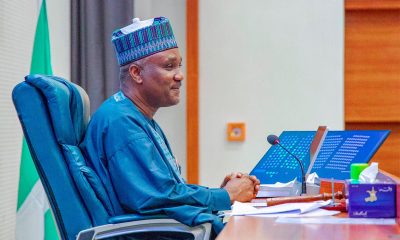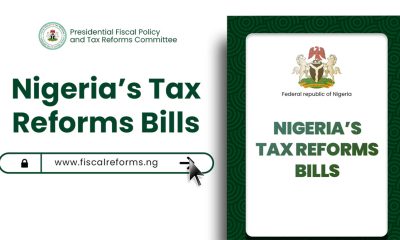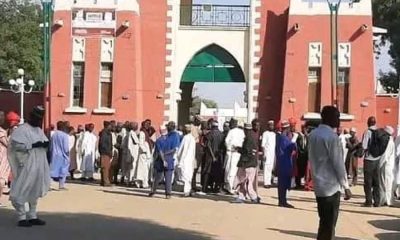Business
FG service domestic debt with N5.24tn in 30 months

Nigeria’s domestic debt service rose to N5.24 trillion in 30 months, data on the Debt Management Office (DMO) website has revealed.
The domestic debt was put at N20.95 trillion as of June 2022.
The latest report by the DMO revealed that domestic debt service in the first quarter of 2022 was at N664.73 billion, representing 0.6 per cent decline from N668.69 billion in the second quarter of 2022.
This implies that the Federal Government has serviced domestic debt with N1.33 trillion in the first half of 2022, a 43 per cent Year-on-Year (YoY) increase from N935.46 billion reported in first half of 2021.
Further breakdown revealed that the government domestic debt service was at N2.05 trillion in 2021, a 10.8 per cent increase from N1.85 trillion in 2020.
Following massive budget deficit, the FG of recent has borrowed aggressively through treasury bills, bonds, savings bonds and Sukuk to support infrastructure development across the country.
Experts have raised concerns as the government continues to obtain new loans from both local and external sources, despite growing debt profile and servicing cost.
The International Monetary Fund (IMF) has predicted that Nigeria’s debt service-to-revenue ratio would jump to 92 per cent in 2022 from 76 per cent in 2021.
Speaking with THISDAY, the CEO, Wyoming Capital & Partners, Mr Tajudeen Olayinka stated that the debt servicing by the federal government over the years has encouraged investors to provide additional support to the government with respect to further investment in government securities.
According to him, “It presents government in good light, with the opportunity to fund developmental projects across the country.
“The negative aspect of debt servicing in Nigeria is the sustainability problem that has now greeted the current administration of President Muhammadu Buhari, whereby, more than 100per cent of revenue is now being expended on debt servicing, giving room for possible default and failure of government in no distant future, especially with respect to foreign debt component.
“The fact that government spends its entire revenue to service debts, despite introducing new taxes and raising rates in some others, is an indication that economic agents are not generating enough outputs, sufficient to put Nigeria’s economy in the positive territory. It is actually a sign of declining output. It is simply a failure of fiscal policy.”
He hinted that the only way to cut the debt service figure down is for government to shift away from its current public sector dominance, and allow private sector businesses to occupy the driver’s seat, so as to consistently put the economy in the positive territory.
“Government should begin to consider removing subsidies in phases, in a manner that will not add more to the hardship on the ground. It also presents an opportunity to allow the economy to run a normal course of adjustment,” he added.
The CEO, Centre for the Promotion of Private Enterprise (CPPE), Dr Muda Yusuf commenting on raising debt profile noted that, “When we take account of borrowings from the CBN and the stock of AMCON debt, the debt profile would be in excess of N60 trillion.
“Although government tends to argue that the conditions was not a debt problem, but a revenue challenge. But debt becomes a problem if the revenue base is not strong enough to service the debt sustainably. It invariably becomes a debt problem and possibly a debt crisis. Government actual revenue can hardly cover the debt service obligations.
“Which implies that the entire capital budget and the recurrent expenditure may have to be funded from borrowing. This is surely not sustainable. The finance minister reported recently that in the first four months of this year, debt service to revenue ratio was over 100per cent.”
According to him, “What is needed is the political will to cut expenditure and undertake reforms that could scale down the size of government, reduce governance cost and ease the fiscal burden on the government.
“It is imperative for the country to operate as a true federation which it claims to be. The unitary character of the country is making it difficult to unlock the economic potentials of the sub nationals. It is perpetuating the culture of dependence on the federal government.
It is necessary to scale down the size of government and cost of governance. Fiscal sustainability is driven by both cost and revenue. Therefore, managing the major drivers of cost and revenue is imperative.
“As far as possible, the government should push back in sectors or activity areas where the private sector has the capacity to deliver desired outcomes. We should see more privatization at all levels of government.
“This would allow for the infusion of more private capital into the infrastructure space. We need to address the fuel subsidy conundrum at some point as it clearly not sustainable.”
– Thisday
Railway
Lagos Rail Mass Transit part of FG free train ride – NRC

Lagos Rail Mass Transit part of FG free train ride – NRC
The Nigerian Railway Corporation (NRC) has disclosed that the Lagos Rail Mass Transit (LRMT) trains are included in the Federal Government’s free train ride initiative for the Christmas and New Year celebrations.
The LRMT, which currently includes the Phase 1 Blue Line Rail and the Phase 1 of the Red Line Rail, operates under the Lagos Metropolitan Area Transport Authority (LAMATA).
This announcement was made by Ben Iloanusi, the Acting Managing Director of the NRC, during an interview on NTA News TV on Friday, following the launch of the initiative earlier that day.
While Iloanusi stated that Phase 1 of both the Blue Line and Red Line Rail projects are part of the program, LAMATA has yet to confirm this inclusion.
READ ALSO:
- Nigeria denies alleged plot to destabilise Niger Republic
- Navy arrests 19 Nigerians attempting to reach Europe by hiding on ship
- Troops arrest four Ambazonian rebels in Taraba
Iloanusi outlined the other routes benefiting from the scheme, which include the Lagos-Ibadan Train Service, Kaduna-Abuja Train Service, Warri-Itakpe Train Service, Port Harcourt-Aba Train Service, and the Bola Ahmed Tinubu Mass Transit in Lagos. Notably, little was previously known about the Bola Ahmed Tinubu Mass Transit service until this disclosure.
“Let me mention the routes where this free train service is happening. We have the Lagos-Ibadan Train Service, we have the Kaduna-Abuja Train Service, we have the Warri-Itakpe Train Service, we have the Lagos Rail Mass Transit trains, we have the Port Harcourt-Aba Train Service, and we have what we call the Bola Ahmed Tinubu Mass Transit, which is also in Lagos,” he stated.
Iloanusi provided operational updates, stating that passengers nationwide can access free tickets online or, for those unable to do so, at train stations where they will be profiled and validated.
He noted that passengers using NRC-managed services (excluding the Lagos Rail Mass Transit) should reserve tickets via the official website, www.nrc.gov.ng, with a valid ID required. He also advised travelers to plan, arrive on time, and bring valid identification.
Lagos Rail Mass Transit part of FG free train ride – NRC
Business
NNPC denies claim of Port Harcourt refinery shutdown

NNPC denies claim of Port Harcourt refinery shutdown
The Nigerian National Petroleum Company Limited (NNPCL) has denied claims in media reports that the newly refurbished Port Harcourt refinery has shut down.
The national oil company denied the claim in a press release issued by its Chief Corporate Communications Officer, Olufemi Soneye, on Saturday.
Soneye said the claim was false and urged Nigerians to disregard it. He stressed that the Port-Harcourt Refinery is fully operational.
READ ALSO:
- Like Ibadan, stampede claim 10 lives for Abuja Catholic church, 17 in Anambra
- Marketers react after NNPCL slashes petrol price to N899 per litre
- Electricity: We installed 184,507 meters, issued 50 licences in Q3, says FG
The statement read, “The attention of the Nigerian National Petroleum Company Limited (NNPC Ltd.) has been drawn to reports in a section of the media alleging that the Old Port Harcourt Refinery which was re-streamed two months ago has been shut down.
“We wish to clarify that such reports are totally false as the refinery is fully operational as verified a few days ago by former Group Managing Directors of NNPC.”
He noted that preparation for the day’s loading operation is currently ongoing, and added that claims of the shutdown are “figments of the imagination of those who want to create artificial scarcity and rip-off Nigerians.”
NNPC denies claim of Port Harcourt refinery shutdown
Business
CBN permits BDCs to buy up to $25,000 FX weekly from NFEM

CBN permits BDCs to buy up to $25,000 FX weekly from NFEM
The Central Bank of Nigeria (CBN) has granted Bureau de Change (BDC) operators temporary permission to purchase up to $25,000 weekly in foreign exchange (FX) from the Nigerian Foreign Exchange Market (NFEM).
The Central Bank of Nigeria (CBN) has granted Bureau de Change (BDC) operators temporary permission to purchase up to $25,000 weekly in foreign exchange (FX) from the Nigerian Foreign Exchange Market (NFEM).
This move, detailed in a circular dated December 19, 2024, is designed to meet seasonal retail demand for FX during the holiday period.
The circular was signed by T.G. Allu, on behalf of the Acting Director of the Trade and Exchange Department.
The arrangement will be in effect from December 19, 2024, to January 30, 2025.
Under the directive, BDCs may purchase FX from a single Authorized Dealer of their choice, provided they fully fund their accounts before accessing the market.
Transactions to occur at the prevailing NFEM rate
The transactions will occur at the prevailing NFEM rate, and BDCs are required to adhere to a maximum 1% spread when pricing FX for retail end-users.
READ ALSO:
- Badenoch’s negative portrayal of Nigeria Police unfair-PCRC
- Bitcoin price crashes to $95,000 as market continues to react to Federal rate cuts
- Bauchi high court dismisses blasphemy, cybercrime charges against Rhoda Jatau
All transactions conducted under this scheme must be reported to the CBN’s Trade and Exchange Department.
The circular read in part:
“In order to meet expected seasonal demand for foreign exchange, the CBN is allowing a temporary access for all existing BDCs to the NFEM for the purchase of FX from Authorised Dealers, subject to a weekly cap of USD 25,000.00 (Twenty-five thousand dollars only).
This window will be open between December 19, 2024 to January 30, 2025.
“BDC operators can purchase FX under this arrangement from only one Authorized Dealer of their choice and will be required to fully fund their account before accessing the market at the prevailing NFEM rate. All transactions with BDCs should be reported to the Trade and Exchange department, and a maximum spread of 1% is allowed on the pricing offered by BDCs to retail end-users.”
The CBN assured the general public that PTA (Personal Travel Allowance) and BTA (Business Travel Allowance) remain available through banks for legitimate travel and business needs.”
These transactions are to be conducted at “market-determined exchange rates” within the NFEM framework.
This initiative reflects the CBN’s strategy to stabilize the FX market and manage seasonal surges in demand.
CBN permits BDCs to buy up to $25,000 FX weekly from NFEM
-

 Railway15 hours ago
Railway15 hours agoLagos Rail Mass Transit part of FG free train ride – NRC
-

 metro2 days ago
metro2 days agoCourt stops customs from seizing imported rice in open market
-

 metro3 days ago
metro3 days agoFG transfers electricity market regulatory oversight in Lagos to LASERC
-

 metro2 days ago
metro2 days agoIbadan stampede: Tinubu orders probe as death toll hits 40
-

 metro2 days ago
metro2 days agoAfe Babalola: Court grants Dele Farotimi bail, barred from media interviews
-

 metro16 hours ago
metro16 hours agoNIMC warns against extortion, reaffirms free NIN enrollment
-

 metro1 day ago
metro1 day agoIbadan stampede: Ooni reacts after arrest of ex-wife
-

 News2 days ago
News2 days agoAdebayo Ogunlesi, 2 other Nigerians make Forbes 50 wealthiest Black Americans list 2024













